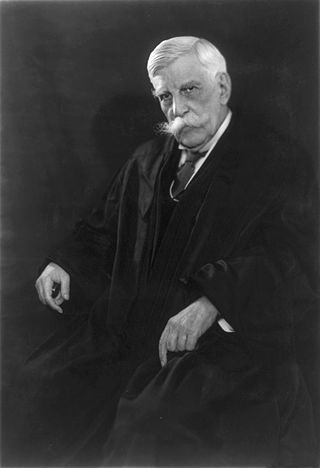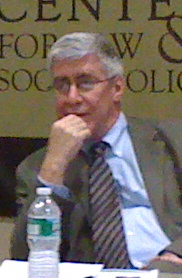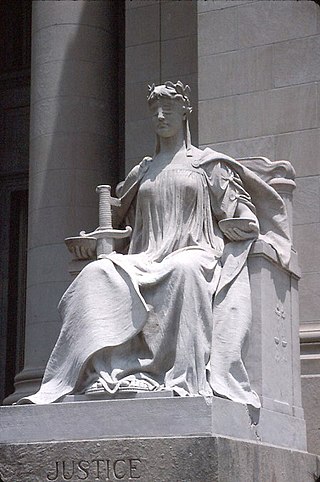See also
Notes
- ↑ Oliver Wendell Holmes Jr., "The Path of the Law", 10 Harvard Law Review 457 (1897).
- 1 2 Hart 1961, p. 40.
Related Research Articles

Jurisprudence, also known as theory of law or philosophy of law, is the examination in a general perspective of what law is and what it ought to be. It investigates issues such as the definition of law; legal validity; legal norms and values; as well as the relationship between law and other fields of study, including economics, ethics, history, sociology, and political philosophy.

Clear and present danger was a doctrine adopted by the Supreme Court of the United States to determine under what circumstances limits can be placed on First Amendment freedoms of speech, press, or assembly. Created by Justice Oliver Wendell Holmes Jr. to refine the bad tendency test, it was never fully adopted and both tests were ultimately replaced in 1969 with Brandenburg v. Ohio's "imminent lawless action" test.
In jurisprudence and legal philosophy, legal positivism is the theory that the existence of the law and its content depend on social facts, such as acts of legislation, judicial decisions, and customs, rather than on morality. This contrasts with natural law theory, which holds that law is necessarily connected to morality in such a way that any law that contradicts morality lacks legal validity.
Legal realism is a naturalistic approach to law; it is the view that jurisprudence should emulate the methods of natural science; that is, it should rely on empirical evidence. Hypotheses must be tested against observations of the world.
In law, a reasonable person, reasonable man, or the man on the Clapham omnibus, is a hypothetical person whose character and care conduct, under any common set of facts, is decided through reasoning of good practice or policy. It is a legal fiction crafted by the courts and communicated through case law and jury instructions. In some practices, for circumstances arising from an uncommon set of facts, this person represents a composite of a relevant community's judgement as to how a typical member of that community should behave in situations that might pose a threat of harm to the public.
Legal formalism is both a descriptive theory and a normative theory of how judges should decide cases. In its descriptive sense, formalists maintain that judges reach their decisions by applying uncontroversial principles to the facts; formalists believe that there is an underlying logic to the many legal principles that may be applied in different cases. These principles, they claim, are straightforward and can be readily discovered by anyone with some legal expertise. Supreme Court Justice Oliver Wendell Holmes Jr., by contrast, believed that "The life of the law has not been logic: it has been experience". The formalist era is generally viewed as having existed from the 1870s to the 1920s, but some scholars deny that legal formalism ever existed in practice.

Herbert Lionel Adolphus Hart was an English legal philosopher. One of the most influential legal theorists of the 20th century, he was instrumental in the development of the theory of legal positivism, which was popularised by his book, The Concept of Law. Hart's contributions focused on the nature of law, the relationship between law and morality, and the analysis of legal rules and systems, introducing concepts such as the "rule of recognition" that have shaped modern legal thought.
Lon Luvois Fuller was an American legal philosopher best known as a proponent of a secular and procedural form of natural law theory. Fuller was a professor of law at Harvard Law School for many years, and is noted in American law for his contributions to both jurisprudence and the law of contracts. His 1958 debate with the British legal philosopher H. L. A. Hart in the Harvard Law Review was important in framing the modern conflict between legal positivism and natural law theory. In his widely discussed 1964 book The Morality of Law, Fuller argues that all systems of law contain an "internal morality" that imposes on individuals a presumptive obligation of obedience. Robert S. Summers said in 1984: "Fuller was one of the four most important American legal theorists of the last hundred years".

Oliver Wendell Holmes Jr. was an American jurist who served as an associate justice of the U.S. Supreme Court from 1902 to 1932. Holmes is one of the most widely cited and influential Supreme Court justices in American history, noted for his long tenure on the Court and for his pithy opinions—particularly those on civil liberties and American constitutional democracy—and deference to the decisions of elected legislatures. Holmes retired from the Court at the age of 90, an unbeaten record for oldest justice on the Supreme Court. He previously served as a Brevet Colonel in the American Civil War, in which he was wounded three times, as an associate justice and chief justice of the Massachusetts Supreme Judicial Court, and as Weld Professor of Law at his alma mater, Harvard Law School. His positions, distinctive personality, and writing style made him a popular figure, especially with American progressives.
Meeting of the minds is a phrase in contract law used to describe the intentions of the parties forming the contract. In particular, it refers to the situation where there is a common understanding in the formation of the contract. Formation of a contract is initiated with a proposal or offer. This condition or element is considered a requirement to the formation of a contract in some jurisdictions.

John Austin was an English legal theorist who posthumously influenced British and American law with an analytical approach to jurisprudence and a theory of legal positivism. Austin opposed traditional approaches of "natural law", arguing against any need for connections between law and morality. Human legal systems, he claimed, can and should be studied in an empirical, value-free way.

The Concept of Law is a 1961 book by the legal philosopher H. L. A. Hart and his most famous work. The Concept of Law presents Hart's theory of legal positivism—the view that laws are rules made by humans and that there is no inherent or necessary connection between law and morality—within the framework of analytic philosophy. Hart sought to provide a theory of descriptive sociology and analytical jurisprudence. The book addresses a number of traditional jurisprudential topics such as the nature of law, whether laws are rules, and the relation between law and morality. Hart answers these by placing law into a social context while at the same time leaving the capability for rigorous analysis of legal terms, which in effect "awakened English jurisprudence from its comfortable slumbers".

Jeremy Waldron is a New Zealand legal philosopher. He holds a University Professorship at the New York University School of Law, is affiliated with the New York University Department of Philosophy, and was formerly the Chichele Professor of Social and Political Theory at All Souls College, Oxford University. Waldron also holds an adjunct professorship at Victoria University of Wellington. Waldron is regarded as one of the world's leading legal and political philosophers.

The Living Constitution, or judicial pragmatism, is the viewpoint that the U.S. constitution holds a dynamic meaning even if the document is not formally amended. The Constitution is said to develop alongside society's needs and provide a more malleable tool for governments. The idea is associated with views that contemporary society should be considered in the constitutional interpretation of phrases. The Constitution is referred to as the living law of the land as it is transformed according to necessities of the time and the situation. Some supporters of the living method of interpretation, such as professors Michael Kammen and Bruce Ackerman, refer to themselves as organicists.
Textualism is a formalist theory in which the interpretation of the law is based exclusively on the ordinary meaning of the legal text, where no consideration is given to non-textual sources, such as intention of the law when passed, the problem it was intended to remedy, or significant questions regarding the justice or rectitude of the law.
The Hart–Fuller debate is an exchange between the American law professor Lon L. Fuller and his English counterpart H. L. A. Hart, published in the Harvard Law Review in 1958 on morality and law, which demonstrated the divide between the positivist and natural law philosophy. Hart took the positivist view in arguing that morality and law were separate. Fuller's reply argued for morality as the source of law's binding power.
Hard cases make bad law is an adage or legal maxim meaning that an extreme case is a poor basis for a general law that would cover a wider range of less extreme cases. In other words, a general law is better drafted for the average circumstance as this will be more common.

Skepticism in law is a school of jurisprudence that was a reaction against the idea of natural law, and a response to the 'formalism' of legal positivists. Legal skepticism is sometimes known as legal realism.
This is an index of articles in jurisprudence.
Henry Melvin Hart Jr. (1904–1969) was an American legal scholar. He was an influential member of the Harvard Law School faculty from 1932 until his death in 1969.
References
- Hart, H. L. A. (1961). The Concept of Law. Clarendon Press.